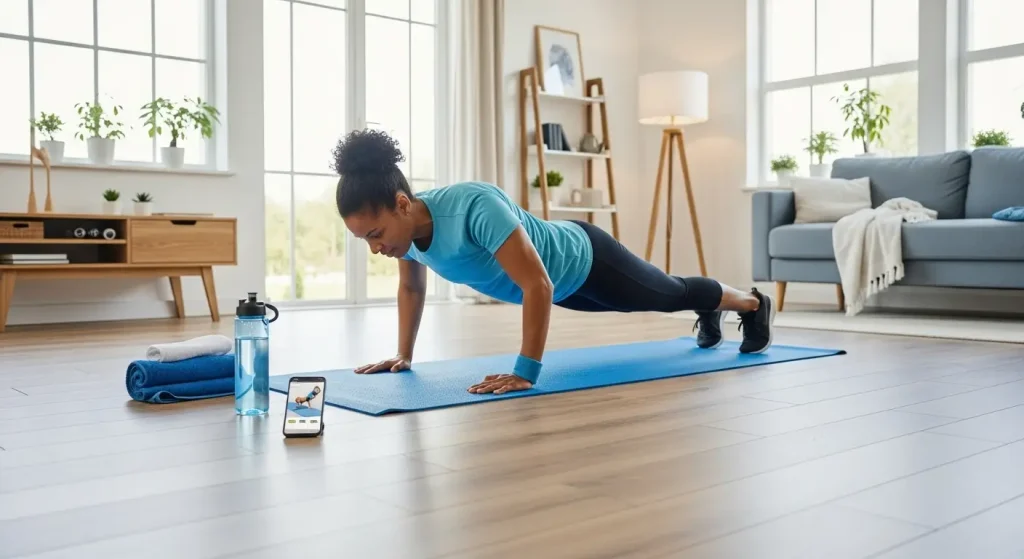Getting fit doesn’t require expensive gym memberships or bulky equipment. With the right fitness routines at home without gym access, you can build strength, lose weight, and improve your overall health using nothing but your body weight. At-home workouts that focus on bodyweight exercises are an effective way to help build strength and muscle mass, improve aerobic fitness, and provide the flexibility to exercise on your own schedule.
Whether you’re a beginner starting your fitness journey or an experienced athlete looking for convenient workout alternatives, home fitness routines offer incredible versatility and effectiveness. This comprehensive guide will show you how to create powerful workout routines that deliver real results without stepping foot in a gym.
Common Mental Health Issues & Self-Care: A Complete Guide to Better Wellbeing
Why Choose Home Fitness Routines Over Gym Workouts?
Convenience and Flexibility
Home workouts eliminate common barriers to exercise like commute time, gym hours, and waiting for equipment. You can exercise at any time that fits your schedule, making consistency easier to maintain. Just 20 minutes, five days a week is all you need to start seeing significant improvements in your fitness level.
Cost-Effective Fitness Solution
Skip expensive gym memberships, personal trainer fees, and equipment costs. Your body provides all the resistance needed for effective strength training and cardiovascular exercise.
Privacy and Comfort
Exercise in the comfort of your own space without feeling self-conscious. This privacy encourages many people to push themselves harder and maintain better workout consistency.
Sleep Hygiene & Tips for Better Sleep: Your Complete Guide to Quality Rest
Essential Bodyweight Exercises for Home Fitness Routines
Upper Body Strength Training Without Equipment
Push-Up Variations
- Standard push-ups target chest, shoulders, and triceps
- Incline push-ups (hands on couch/chair) for beginners
- Diamond push-ups for tricep emphasis
- Wide-grip push-ups for chest focus
No-Equipment Pull Exercises
- Pike push-ups for shoulder development
- Inverted rows using a sturdy table
- Superman exercises for back strength
- Wall sit exercises for isometric training
Lower Body Power with Bodyweight Exercises
Squat Variations for Home Workouts
- Bodyweight squats for foundational strength
- Jump squats for explosive power
- Single-leg pistol squats for advanced training
- Wall sits for endurance building
Lunge Patterns
- Forward lunges for quad development
- Reverse lunges for glute activation
- Side lunges for hip mobility
- Walking lunges for dynamic movement
Core Strengthening Without Gym Equipment
Plank Variations
- Standard planks for core stability
- Side planks for oblique strength
- Plank-to-push-up for dynamic training
- Mountain climbers for cardio integration
Stress Management Techniques: 12 Proven Methods to Reduce Anxiety
Complete Home Fitness Routine Programs
Beginner 20-Minute Home Workout Routine
Complete 2 sets of 10 to 15 reps of each exercise, with 30 seconds to 1 minute of rest between each move. This circuit should take about 15 to 20 minutes.
Week 1-2 Routine:
- Warm-up (3 minutes)
- Arm circles: 30 seconds
- Leg swings: 30 seconds
- Jumping jacks: 60 seconds
- Marching in place: 60 seconds
- Main Workout (15 minutes)
- Bodyweight squats: 10-12 reps
- Modified push-ups: 8-10 reps
- Stationary lunges: 8 per leg
- Plank hold: 20-30 seconds
- Glute bridges: 12-15 reps
- Mountain climbers: 20 total
- Cool-down (2 minutes)
- Gentle stretching and deep breathing
Intermediate Full-Body Home Fitness Routine
3-4 Days Per Week Program:
Day 1: Upper Body Focus
- Push-up variations: 3 sets x 12-15 reps
- Pike push-ups: 3 sets x 8-12 reps
- Tricep dips (using chair): 3 sets x 10-12 reps
- Inverted rows: 3 sets x 8-10 reps
- Plank variations: 3 sets x 45 seconds
Day 2: Lower Body Power
- Squat variations: 3 sets x 15-20 reps
- Lunge combinations: 3 sets x 12 per leg
- Single-leg glute bridges: 3 sets x 10 per leg
- Calf raises: 3 sets x 20 reps
- Wall sit: 3 sets x 60 seconds
Advanced High-Intensity Home Workout
A 20-minute CrossFit bodyweight AMRAP – consisting of five pull-ups, 10 push-ups and 15 squats – provided a ‘greater training stimulus’ than running on a treadmill for the same duration.
HIIT Circuit (4 Rounds, 45 seconds work, 15 seconds rest):
- Burpees
- Jump squats
- Push-up to T
- High knees
- Plank jacks
- Mountain climbers
How to Budget & Save Money Effectively: A Complete Guide
Creating Your Personal Home Fitness Schedule
Weekly Workout Planning
Balanced Approach:
- Monday: Upper body strength
- Tuesday: Cardio/HIIT routine
- Wednesday: Lower body focus
- Thursday: Active recovery (yoga/stretching)
- Friday: Full-body circuit
- Weekend: Outdoor activities or rest
Progressive Overload Without Weights
Increase workout intensity through:
- Adding more repetitions
- Extending exercise duration
- Reducing rest periods
- Incorporating advanced exercise variations
- Combining movements for compound exercises
Ultimate Guide to London on a Budget
Maximizing Results from Home Fitness Routines
Nutrition for Home Workouts
Support your fitness routines with proper nutrition:
- Eat protein-rich meals post-workout for muscle recovery
- Stay hydrated throughout the day
- Time carbohydrates around workout sessions
- Include plenty of vegetables for micronutrient support
Recovery and Rest Days
It’s recommended adults get at least 150 minutes of moderate physical activity a week, or around 20 to 30 minutes a day. Plus, you should aim to do strengthening and balance exercises at least twice a week.
Recovery Strategies:
- Prioritize 7-9 hours of quality sleep
- Include gentle stretching or yoga on rest days
- Practice stress management techniques
- Listen to your body and avoid overtraining
Tracking Progress Without Gym Equipment
Monitor your fitness improvements through:
- Counting reps and tracking increases
- Timing plank holds and other isometric exercises
- Taking progress photos
- Measuring body circumferences
- Noting energy levels and mood improvements
Ultimate Guide to Paris: Insider Tips for First-Time Travelers
Common Mistakes to Avoid in Home Workouts
Form and Technique Errors
Without gym mirrors and trainers, maintaining proper form becomes crucial:
- Start with slower, controlled movements
- Focus on quality over quantity
- Use online videos for form guidance
- Progress gradually to avoid injury
Consistency Challenges
Staying Motivated at Home:
- Set specific workout times
- Create a dedicated exercise space
- Use workout apps or videos for guidance
- Track your progress visually
- Find an accountability partner
Britain’s Secret Beaches: Fossils, Dolphins & Hidden Beauty
Frequently Asked Questions (FAQ)
Can I build muscle with home fitness routines without gym equipment?
Yes, you can absolutely build muscle with bodyweight exercises and home fitness routines. Bodyweight exercises are simple, effective ways to improve balance, flexibility, and strength without gym machines or equipment. Progressive overload can be achieved by increasing reps, extending exercise duration, or advancing to more challenging variations like single-arm push-ups or pistol squats.
How often should I do home workouts for best results?
For optimal results, aim for 3-5 home workout sessions per week, allowing rest days for recovery. Beginners should start with 3 days per week, while more experienced individuals can handle 4-5 sessions. These exercises, such as pushups, squats, lunges and planks, are a great way to build muscle and lose weight when performed consistently over time.
What’s the best time of day for home fitness routines?
The best time for home workouts is whenever you can be most consistent. Many people prefer morning workouts to energize their day and avoid scheduling conflicts. However, the most important factor is choosing a time you can stick to regularly. Whether it’s early morning, lunch break, or evening, consistency trumps timing for long-term success.
5 Easy Healthy Breakfast Ideas for Busy Mornings
Start Your Home Fitness Journey Today
Home fitness routines without gym equipment offer unlimited potential for improving your health, building strength, and achieving your fitness goals. The key to success lies in starting with appropriate exercises for your fitness level, maintaining consistency, and progressively challenging yourself over time.
Transform your fitness journey with professional-grade home workout equipment and guided programs. Get started with our recommended fitness accessories and online training programs.










